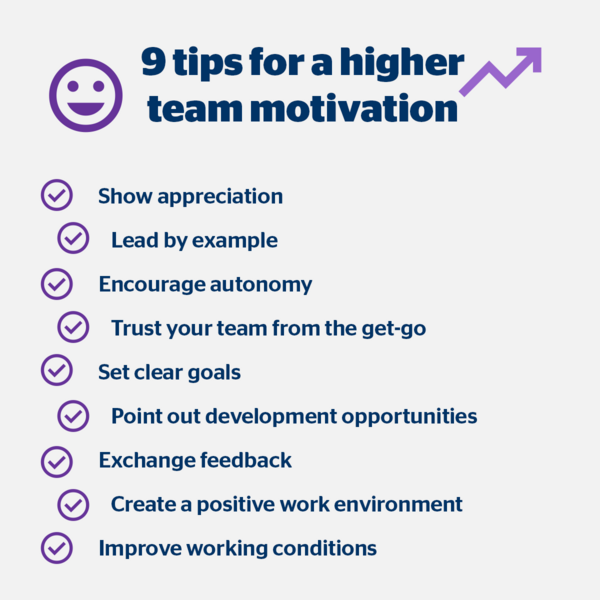Team motivation: 9 tips for motivating your team
|

reading time: ca. 4 minutes
- The right motivation is crucial for the success of a team. With a lot of appreciation, recognition, and trust in each other, you can encourage your team members and improve team spirit.
- Always set a good example. Be positive and committed to show your team members what you believe is good teamwork.
- Working towards a common goal has a motivating effect on the whole team. A good feedback culture and a positive working atmosphere also increase motivation.
- Adjust your approach regularly to suit the team, its needs, and current goals.
Contents
- Team motivation – what is it all about?
- Motivate your team: 9 tips
- Tip 1: Show recognition and appreciation
- Tip 2: Lead by example
- Tip 3: Encourage autonomy
- Tip 4: Trust your team from the get-go
- Tip 5: Set clear goals and expectations
- Tip 6: Point out development opportunities
- Tip 7: Exchange feedback
- Tip 8: Create a positive work environment
- Tip 9: Improve working conditions
- How do I stay motivated to lead my team?
To make a team successful, it is essential that all members are committed. When everyone supports each other, the entire team benefits. Regardless of whether you are part of the team yourself or a manager who wants to increase team motivation: Here are the best tips for motivating a team.
Self-motivation is an important requirement for working successfully and productively. But that is not everything – a strong team can achieve much more together than an individual alone. To achieve this, it is important that every team member is motivated and has fun.
Motivate your team: 9 tips
It doesn't matter whether you are part of the team or a manager: Sometimes even small things can help to motivate your team and colleagues, such as a smile or a kind word.
When everyone in the team is motivated, many important factors improve:
- Working atmosphere
- Team spirit and communication
- Creativity and innovation
- Productivity
- And last but not least: the collective work results and team success

Tip 1: Show recognition and appreciation
Acknowledge and celebrate the successes of others, no matter how small. Show appreciation for the hard work and dedication of your team. A simple thank you can go a long way.
If you are part of the team yourself, you can show that you believe in your colleagues by giving them praise or appreciative words.
Especially as a manager, you should recognise the work of your employees. It is important to maintain a human connection and a level of respect for each other instead of trying to force old-fashioned management methods. Modern leadership styles (“New Leadership”) are based on cooperation and trust.
Tip 2: Lead by example
Live the enthusiasm, commitment, and work ethic you wish to see in your team.
Set a good example, even if things are not going perfectly in your team. If you are motivated and enjoy your work, the rest of your team will follow suit.
Show what you mean by good teamwork instead of just talking about it, true to the motto “practice what you preach”.
Tip 3: Encourage autonomy
When working closely on joint projects, encourage your colleagues to take responsibility for individual tasks.
As a manager, you should give your team the freedom they need to achieve their goals effectively.
Don't be afraid to trust them with making their own decisions and avoid micromanagement – too much control is demotivating.
Tip 4: Trust your team from the get-go
Trust is the basis for good teamwork. If you can rely on each other, the working atmosphere, communication, and team motivation will improve.
In many cases, it is necessary to trust each other in advance. Believe in your team members before you even see the final results.
Tip 5: Set clear goals and expectations
Establish clear, achievable goals that provide direction and a sense of purpose for all team members. Make sure roles and expectations are well defined to avoid confusion and frustration.
Achieve common goals by encouraging and supporting each other. And: celebrate successes, milestones, and completed projects as a team.
Tip 6: Point out development opportunities
Encourage your colleagues to grow and develop. Suggest training courses or workshops, for example. Perhaps you can even train together as a team.
Share new insights and knowledge with your team members so that everyone benefits and improves.
If you lead a team, regularly encourage meaningful training opportunities. Show your employees how their tasks and goals contribute to their career advancement and personal development.
Tip 7: Exchange feedback
Offer constructive feedback that helps colleagues understand how they can improve. Be specific and focus on actions and examples rather than personal attributes.
A good feedback culture is the key to mutual progress and development.
Encourage your employees to share their thoughts, ideas, and concerns. When everyone feels heard and valued, their engagement and motivation improve. Regularly check in with your team members individually to understand their challenges and goals.
Tip 8: Create a positive work environment
Establish a positive work environment. Promote work-life balance to ensure your team does not burn out. Regular breaks, flexible work schedules, and open communication help to maintain motivation.
Develop a positive company culture that encourages teamwork and upholds mutual respect.
Regular team activities also help to strengthen team spirit and promote solidarity.
Tip 9: Improve working conditions
Nothing helps? It might be a systemic issue then. Talk to your manager or the HR department if you feel that the working conditions are slowing down team morale.
Perhaps a solution at an organisational level is required, for example fair pay, reasonable workloads, or transparent career opportunities.
Motivated employees are not only more satisfied but also contribute to the success of the entire company in the long term.
How do I stay motivated to lead my team?
To motivate your team, the key is to be motivated yourself. Various self-motivation strategies can help with this.
The good thing is that if you set a good example and encourage and support your team members, you will get it back when you need it, for example in phases when you are less motivated yourself.
Most important: Always adapt your motivational strategies to fit the values, aspirations, and needs of your team. Regularly reassess your approach to ensure it remains effective as your team and organisation evolve.






